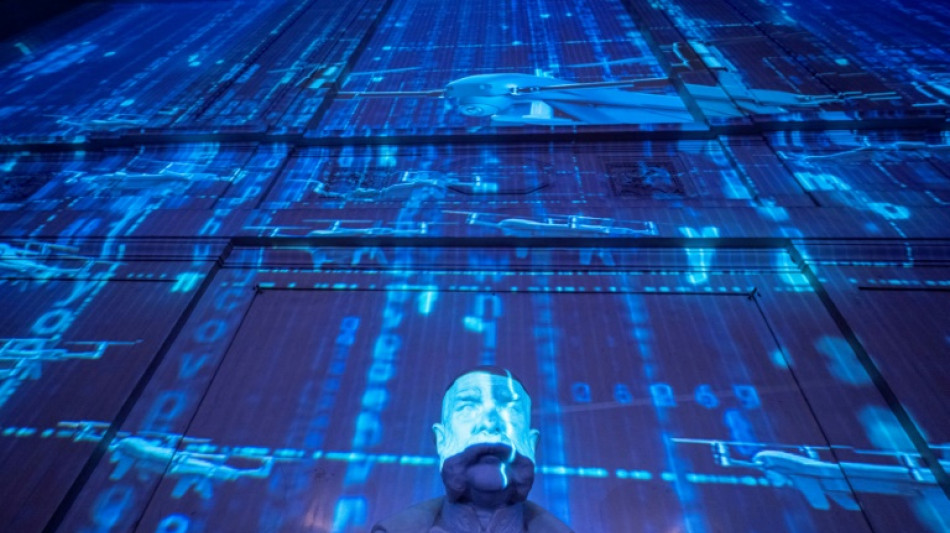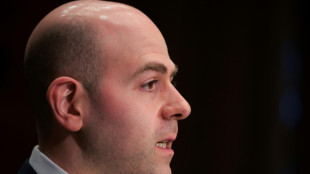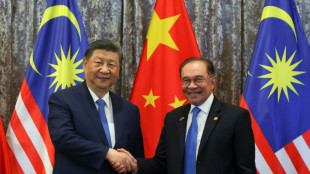
-
 Zuckerberg denies Meta bought rivals to conquer them
Zuckerberg denies Meta bought rivals to conquer them
-
Starc stars as Delhi beat Rajasthan in Super Over

-
 Weinstein asks to sleep in hospital, citing prison 'mistreatment'
Weinstein asks to sleep in hospital, citing prison 'mistreatment'
-
Amorim asks McIlroy to bring Masters magic to Man Utd

-
 Ruud keeps Barcelona Open defence on course
Ruud keeps Barcelona Open defence on course
-
Trump tariffs could put US Fed in a bind, Powell warns

-
 CONCACAF chief rejects 64-team World Cup plan for 2030
CONCACAF chief rejects 64-team World Cup plan for 2030
-
Putin praises Musk, compares him to Soviet space hero

-
 Son to miss Spurs' Europa League trip to Frankfurt
Son to miss Spurs' Europa League trip to Frankfurt
-
US senator in El Salvador seeking release of wrongly deported migrant

-
 Trump tariffs could put the US Fed in a bind, Powell warns
Trump tariffs could put the US Fed in a bind, Powell warns
-
US judge says 'probable cause' to hold Trump admin in contempt

-
 India opposition slams graft charges against Gandhis
India opposition slams graft charges against Gandhis
-
Nate Bargatze to host Emmys: organizers

-
 US Fed Chair warns of 'tension' between employment, inflation goals
US Fed Chair warns of 'tension' between employment, inflation goals
-
Trump touts trade talks, China calls out tariff 'blackmail'

-
 US judge says 'probable cause' to hold govt in contempt over deportations
US judge says 'probable cause' to hold govt in contempt over deportations
-
US eliminates unit countering foreign disinformation

-
 Germany sees 'worrying' record dry spell in early 2025
Germany sees 'worrying' record dry spell in early 2025
-
Israel says 30 percent of Gaza turned into buffer zone

-
 TikTok tests letting users add informative 'Footnotes'
TikTok tests letting users add informative 'Footnotes'
-
Global uncertainty will 'certainly' hit growth: World Bank president

-
 EU lists seven 'safe' countries of origin, tightening asylum rules
EU lists seven 'safe' countries of origin, tightening asylum rules
-
Chelsea fans must 'trust' the process despite blip, says Maresca

-
 Rebel rival government in Sudan 'not the answer': UK
Rebel rival government in Sudan 'not the answer': UK
-
Prague zoo breeds near-extinct Brazilian mergansers

-
 Macron to meet Rubio, Witkoff amid transatlantic tensions
Macron to meet Rubio, Witkoff amid transatlantic tensions
-
WTO chief says 'very concerned' as tariffs cut into global trade

-
 Sports bodies have 'no excuses' on trans rules after court ruling: campaigners
Sports bodies have 'no excuses' on trans rules after court ruling: campaigners
-
Zverev joins Shelton in Munich ATP quarters

-
 The Trump adviser who wants to rewrite the global financial system
The Trump adviser who wants to rewrite the global financial system
-
US senator travels to El Salvador over wrongly deported migrant

-
 UN watchdog chief says Iran 'not far' from nuclear bomb
UN watchdog chief says Iran 'not far' from nuclear bomb
-
Trump says 'joke' Harvard should be stripped of funds

-
 Macron vows punishment for French prison attackers
Macron vows punishment for French prison attackers
-
Canada central bank holds interest rate steady amid tariffs chaos

-
 Rubio headed to Paris for Ukraine war talks
Rubio headed to Paris for Ukraine war talks
-
Australian PM vows not to bow to Trump on national interest

-
 New attacks target France prison guard cars, home
New attacks target France prison guard cars, home
-
Global trade uncertainty could have 'severe negative consequences': WTO chief

-
 Google facing £5 bn UK lawsuit over ad searches: firms
Google facing £5 bn UK lawsuit over ad searches: firms
-
Onana to return in goal for Man Utd against Lyon: Amorim

-
 Tiktok bans user behind Gisele Pelicot 'starter kit' meme
Tiktok bans user behind Gisele Pelicot 'starter kit' meme
-
'Put it on': Dutch drive for bike helmets

-
 China's Xi meets Malaysian leaders, vows to 'safeguard' Asia allies
China's Xi meets Malaysian leaders, vows to 'safeguard' Asia allies
-
France urges release of jailed Russian journalists who covered Navalny

-
 Gabon striker Boupendza dies after 11th floor fall
Gabon striker Boupendza dies after 11th floor fall
-
UK top court rules definition of 'woman' based on sex at birth

-
 PSG keep Champions League bid alive, despite old ghosts reappearing
PSG keep Champions League bid alive, despite old ghosts reappearing
-
Stocks retreat as US hits Nvidia chip export to China


Firms and researchers at odds over superhuman AI
Hype is growing from leaders of major AI companies that "strong" computer intelligence will imminently outstrip humans, but many researchers in the field see the claims as marketing spin.
The belief that human-or-better intelligence -- often called "artificial general intelligence" (AGI) -- will emerge from current machine-learning techniques fuels hypotheses for the future ranging from machine-delivered hyperabundance to human extinction.
"Systems that start to point to AGI are coming into view," OpenAI chief Sam Altman wrote in a blog post last month. Anthropic's Dario Amodei has said the milestone "could come as early as 2026".
Such predictions help justify the hundreds of billions of dollars being poured into computing hardware and the energy supplies to run it.
Others, though are more sceptical.
Meta's chief AI scientist Yann LeCun told AFP last month that "we are not going to get to human-level AI by just scaling up LLMs" -- the large language models behind current systems like ChatGPT or Claude.
LeCun's view appears backed by a majority of academics in the field.
Over three-quarters of respondents to a recent survey by the US-based Association for the Advancement of Artificial Intelligence (AAAI) agreed that "scaling up current approaches" was unlikely to produce AGI.
- 'Genie out of the bottle' -
Some academics believe that many of the companies' claims, which bosses have at times flanked with warnings about AGI's dangers for mankind, are a strategy to capture attention.
Businesses have "made these big investments, and they have to pay off," said Kristian Kersting, a leading researcher at the Technical University of Darmstadt in Germany and AAAI member.
"They just say, 'this is so dangerous that only I can operate it, in fact I myself am afraid but we've already let the genie out of the bottle, so I'm going to sacrifice myself on your behalf -- but then you're dependent on me'."
Scepticism among academic researchers is not total, with prominent figures like Nobel-winning physicist Geoffrey Hinton or 2018 Turing Prize winner Yoshua Bengio warning about dangers from powerful AI.
"It's a bit like Goethe's 'The Sorcerer's Apprentice', you have something you suddenly can't control any more," Kersting said -- referring to a poem in which a would-be sorcerer loses control of a broom he has enchanted to do his chores.
A similar, more recent thought experiment is the "paperclip maximiser".
This imagined AI would pursue its goal of making paperclips so single-mindedly that it would turn Earth and ultimately all matter in the universe into paperclips or paperclip-making machines -- having first got rid of human beings that it judged might hinder its progress by switching it off.
While not "evil" as such, the maximiser would fall fatally short on what thinkers in the field call "alignment" of AI with human objectives and values.
Kersting said he "can understand" such fears -- while suggesting that "human intelligence, its diversity and quality is so outstanding that it will take a long time, if ever" for computers to match it.
He is far more concerned with near-term harms from already-existing AI, such as discrimination in cases where it interacts with humans.
- 'Biggest thing ever' -
The apparently stark gulf in outlook between academics and AI industry leaders may simply reflect people's attitudes as they pick a career path, suggested Sean O hEigeartaigh, director of the AI: Futures and Responsibility programme at Britain's Cambridge University.
"If you are very optimistic about how powerful the present techniques are, you're probably more likely to go and work at one of the companies that's putting a lot of resource into trying to make it happen," he said.
Even if Altman and Amodei may be "quite optimistic" about rapid timescales and AGI emerges much later, "we should be thinking about this and taking it seriously, because it would be the biggest thing that would ever happen," O hEigeartaigh added.
"If it were anything else... a chance that aliens would arrive by 2030 or that there'd be another giant pandemic or something, we'd put some time into planning for it".
The challenge can lie in communicating these ideas to politicians and the public.
Talk of super-AI "does instantly create this sort of immune reaction... it sounds like science fiction," O hEigeartaigh said.
C.Koch--VB




